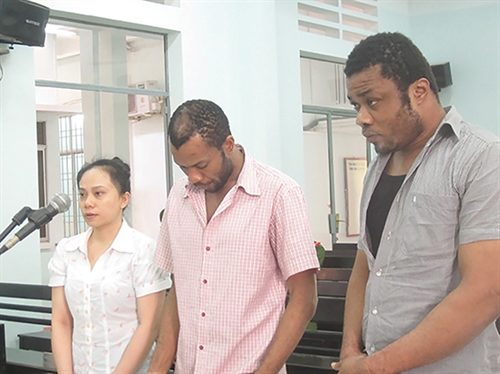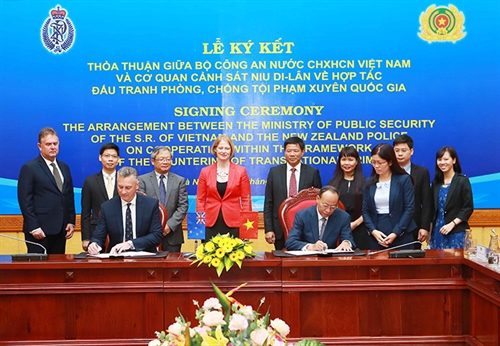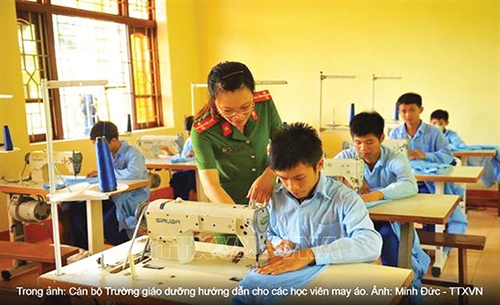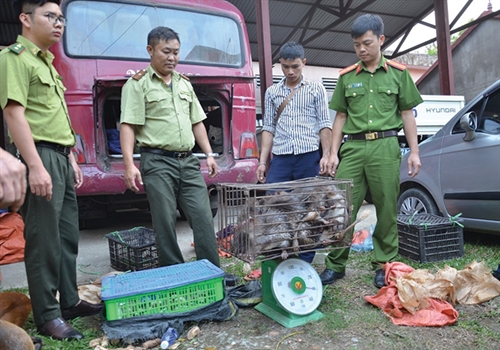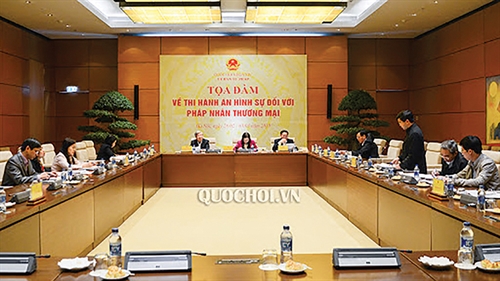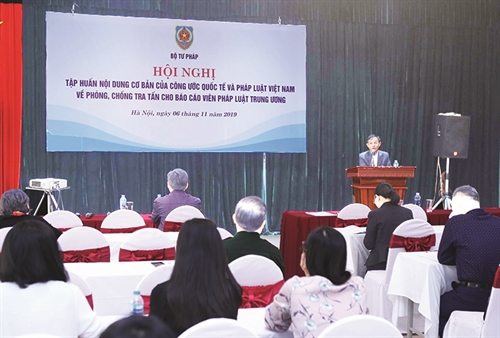Nguyen Thi Thuy Hang[1], LL.D.
Hue University of Law
Litigants’ procedural rights under the 2015 Civil Procedure Code
(the Code)
In order to enable civil litigants to best defend their lawful rights and interests before the court, the Code prescribes their general and specific procedural rights in different procedural stages.
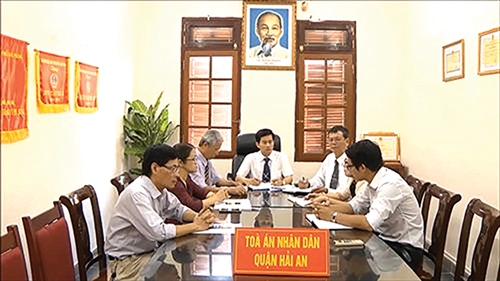 |
| A working session of the Mediation and Dialogue Center at the People’s Court of Hai An district, Hai Phong city__Photo: Internet |
General procedural rights of litigants provided in the Code include:
(i) to maintain, change, add or withdraw their claims;
(ii) to provide documents and evidences to defend their lawful rights and interests;
(iii) to defend by themselves or ask others to defend their lawful rights and interests;
(iv) to ask agencies, organizations and individuals that are keeping or managing relevant documents and evidences to provide them;
(v) to access, take note of, and photocopy documents and evidences produced by other litigants or those collected by the court; to receive valid notices from the court;
(vi) to attend court hearings and meetings; to raise questions to other persons on matters that are related to their civil cases or propose to the court matters that need to be asked of other persons, or confront other litigants or witnesses;
(vii) to reach agreement with other parties on settlement of their cases or participate in conciliations;
(viii) to be provided with extracts of court judgments or rulings;
(ix) to appeal against or complain about court judgments or rulings; and
(x) to request competent persons to make protests according to cassation or reopening procedures against legally effective judgments or rulings[2] of
the court.
In addition, the Code grants litigants other rights to request the court to verify and collect evidences of cases when they cannot do so by themselves or to request the court to summon witnesses or solicit expert assessment or property valuation; and to debate at court hearings and present arguments on assessment of evidences and applicable laws[3].
To ensure litigants properly exercise their procedural rights, the Code provides manners in which their rights may be exercised: “To exercise litigant rights in good faith, to refrain from abusing these rights in order to obstruct proceedings of the court and procedural acts of other litigants; and to bear consequences in accordance with this Code for failure to perform obligations.”[4] This aims to prevent litigants from abusing their procedural rights to hamper the exercise of procedural rights by other litigants while participating in civil proceedings.
Most of specific procedural rights of litigants provided in the Code are the same as those provided in the 2011 Code. However, in order to enable litigants with different statuses to have opportunities and powers in deciding on embroiled matters, the Code adds some new rights for different types of litigants. For example, plaintiffs now may choose to accept or reject part or the whole of counter-claims of defendants or independent claims of persons with related interests or obligations[5]; defendants may choose to accept or reject part or the whole of claims of plaintiffs or independent claims of persons with related interests or obligations and may make independent claims with regard to persons with related interests or obligations[6]; and persons with related interests or obligations may file lawsuits in other cases if their independent claims are not accepted by the court for settlement in the same case[7]. These provisions aim to give litigants greater autonomy in choosing to accept or reject claims of their adversaries. Basically, the Code fully and reasonably recognizes procedural rights of litigants, thus enabling them to take necessary procedural acts to defend their lawful rights and interests when participating in court proceedings. However, there are some rights not yet recognized by the Code or recognized in an inadequate manner.
Limitations in the Code’s provisions on procedural rights of litigants
The Code is silent on the right to initiate class-action lawsuits. As a special form of civil proceedings whereby multiple plaintiffs may sue the same defendant in the same lawsuit, class actions help save costs for plaintiffs, facilitate settlement by the court of a single civil case involving many plaintiffs instead of separate cases of similar nature and reduce the court’s workload. Vietnam’s law has provided the right to initiate class-action lawsuits which, however, only apply to certain cases. Typical are cases where employees’ collective representative organizations initiate labor lawsuits to defend lawful rights and interests of employees’ collectives, and social organizations participate in defending consumers’ interests may represent consumers in taking class actions against sellers to defend consumer interests or public interests in accordance with the Law on Protection of Consumer Interests.
Its provisions on the right of litigants to complain about court judgments or rulings[8] fail to guarantee its exercise. For example, in the course of resolving a civil case, in addition to court judgments and rulings, proceeding-conducting bodies or persons may issue other procedural documents, such as notices[9], summons and invitations. As per the current provision, a litigant may be overlooked when one of such documents is issued while he/she has no right to ask about it in order to exercise his/her lawful rights and obligations. Furthermore, the Code is also silent about the right to complain about civil procedural acts of proceeding-conducting bodies or persons[10].
The Code recognizes the right of litigants to request competent persons to make protests according to cassation or reopening procedures against legally effective court judgments or rulings[11] but makes no provision on the right to request competent persons or agencies to request or recommend review of rulings of the Supreme People’s Court’s Judicial Council according to special procedures.
The provisions on the right of litigants to request property valuation are also not up to practical requirements on property valuation. This right is referred to in Clause 7, Article 70 and specified in Clause 5, Article 104 of the Code regarding cases of property revaluation requested by litigants when having grounds to believe that first-time valuation results are inaccurate or fail to match market prices in the localities where the property is located at the time of settlement of civil cases.
The Code is also vague about the right of litigants to (hearing by) an independent and impartial tribunal within a reasonable time. According to international legal instruments on human rights, this is a fundamental right of litigants and should be provided in domestic laws. Though stressing the independence, impartiality and objectivity of the court in civil proceedings[12] and that the court must promptly conduct hearings within the prescribed time limit[13], the Code remains unspecific about the right to an independent and impartial tribunal within a reasonable time as a fundamental human or procedural right of litigants associated with statutory requirements on quality and effectiveness of court proceedings.
Though permitting litigants to request the court to decide on application, change or cancellation of provisional urgent measures[14], the Code contains no specific provision on their right to request application of such measures before initiating civil lawsuits or independently from main lawsuits. This makes Vietnam’s civil procedure law not flexible and practical enough to help address growing civil and commercial disputes especially in the present context of international economic integration[15].
Some recommendations
Based on the above analyses, we recommend the following improvements regarding procedural rights of
litigants:
Firstly, the right to initiate class-action lawsuits and procedures for exercising it should be spelt out more specifically in the Code. As a special procedural method to defend disadvantaged plaintiffs against defendants with economic advantages (corporate employers) or political power (administrations’ representatives), class action is provided in the Code as a method of resolving collective labor and consumer interest-related disputes. However, in practice, the fast growth of various civil, labor and commercial relations and disputes necessitates the application of this method to resolve environment-related disputes, claims for compensations for non-contractual damage or contractual breaches, etc. Therefore, the civil procedure law should extend the application of this method to a much wider range of disputes that might arise in reality.
Vietnam may choose from among existing class action models, including opt-out class actions, opt-in class actions, representative actions, group actions, and test case. For labor and consumer interest-related cases, class-action lawsuits may be initiated under Article 187 of the Code. However, to facilitate smooth application of this method, the Code should be added with clear definitions, conditions and procedures for initiation of class-action lawsuits.
Secondly, the provisions on the right to complain should be revised toward fully and reasonably recognizing this right as a legal ground for exercising other procedural rights of litigants. Based on complaints of litigants, the court may consider restoring their procedural rights which are infringed upon in its judgments or rulings as well as other procedural documents. Clause 22, Article 70 of the Code should be revised as follows: “(Parties have the right) to appeal against court judgments and rulings; or to complain about court judgments, rulings, other procedural documents issued by the court and procedural acts of proceeding-conducting persons in accordance with this Code”.
Thirdly, Chapter XXII provides procedures for reviewing rulings of the Supreme People’s Court’s Judicial Council but contains no specific provision on the right of litigants to propose or request competent persons or agencies to recommend or request such review. It is recommended the Code clarify this right since it is important and necessary for litigants to defend their lawful rights and interests which are not actually defended by the court at the first-instance, appellate, cassation or reopening level according to special procedures.
Fourthly, the provisions on the right of litigants to request property valuation or revaluation[16] should be revised to be more specific and flexible as follows: “Property revaluation shall be carried out when there are grounds to believe that previous valuation results are inaccurate or do not match market prices in the localities where property is located at the time of settlement of civil cases.” Besides, the provisions relevant to this right should also be amended to be more specific and practical, including those on the rights and obligations of property valuation council members in helping the court and litigants determine the real value of property in order to support litigants’ claims, and those on the responsibility of members who are absent from the valuation council or make untruthful valuation conclusions. Specifically, Article 104 of the Code should be revised as follows:
“1. Rights and obligations of valuation council members:
a/ To be present according to the court’s summons;
b/ To refrain from contacting other proceeding participants as such contact might affect truthfulness and objectivity of valuation results;
c/ To be entitled to travel allowance and other allowances in accordance with law;
d/ To undertake before the court for exercise of their rights and performance of their obligations.
2. Property valuators that fail to join property valuation councils without plausible reasons or make untruthful valuation conclusions or fail to be present according to court summons without plausible reasons shall be held responsible in accordance with law.
3. A property valuator shall refuse to carry out valuation or be replaced in one of the following cases:
a/ He falls into one of the cases specified in Article 52 of this Code;
b/ He has participated in proceedings as a defense counsel for lawful rights and interests of litigants, witnesses or interpreters in the same case;
c/ He has conducted proceedings in the capacity as a judge, people’s assessor, court clerk or procurator.”
In addition, Article 52 of the Code should additionally specify cases where a person who participates in proceedings as a property valuator in the same case shall refuse or participate in proceedings or be changed.
Fifthly, the Code should additionally provide the right to (hearing by) an independent and impartial tribunal within a reasonable time in order to be conformable with common civil procedure regulations around the world. As a basic procedural right of litigants recognized by many countries, this right is decisive to the quality and effectiveness of civil judicial activities.
Lastly, the Code should add the right to request application of provisional urgent measures before lawsuits are initiated. Realities show that it takes time for litigants to prepare documents necessary for the initiation of lawsuits and if they can only request application of urgent measures after filing lawsuits or the court accepts their lawsuits, their adversaries might manage to disperse property or destroy evidences, thus affecting the settlement of their cases. This right would help litigants and the court defend property and promptly collect evidences.
The Code should also specify the case where disputing parties that do not intend to initiate lawsuits only request the court to apply provisional urgent measures to other disputing parties in order to comply with its Article 414 on requests for application, change or cancellation of provisional urgent measures by the court.
As such, Article 100.2 of the Code should be revised as follows: “In case, due to an emergency circumstance, it is necessary to promptly defend evidences and prevent possible serious consequences, an agency, organization or individual may request a competent court to issue a ruling on application of a provisional urgent measure specified in Article 114 of this Code simultaneously with filing a lawsuit or before initiating a lawsuit at court. Agencies, organizations and individuals may request application of provisional urgent measures independently from main lawsuits and the court is obliged to settle this civil matter.”-
[1] Email: hangntt@hul.edu.vn[2] Clauses 4, 5, 6, 8, 10, 11, 12, 13, 15, 19, 21, 22 and 23, Article 70 of the Code. These rights are the same as those provided in Article 58 of the 2011 Civil Procedure Code.[3] Clauses 7 and 20, Article 70 of the Code.[4] Clause 25, Article 70 of the Code.[5] Clause 3, Article 71 of the Code.[6] Clauses 3 and 5, Article 72 of the Code.[7] Clause 2, Article 73 of the Code.[8] Clause 22, Article 70 of the Code.[9] For example: notice of case acceptance, notice of proceeding heir upon death of a litigant, notice of valuation, etc.[10] This right is mentioned in an unspecific manner in Article 499 of the Code.[11] Clause 23, Article 70 of the Code.[12] Articles 12 and 16 of the Code. [13] Article 15 of the Code.[14] Clause 10, Article 70 of the Code.[15] Civil procedure laws of the United States, France and China all empower civil litigants to request the court to apply urgent measures before lawsuit initiation or in the course of settlement of main lawsuits or in a totally independent manner. Timely application of urgent measures can help protect evidences and property involved in civil cases or matters from being destroyed or dispersed, thus defending lawful rights and interests of litigants, or even make initiation of civil lawsuits at court no longer necessary as soon as disputing parties can themselves settle their disputes through urgent measures, thereby reducing civil hearing load for the court.[16] Clause 5, Article 104 of the Code.
